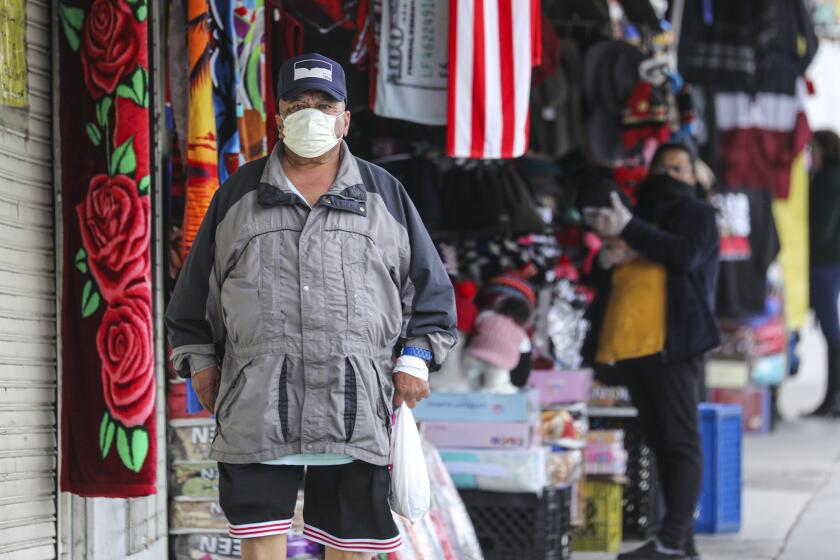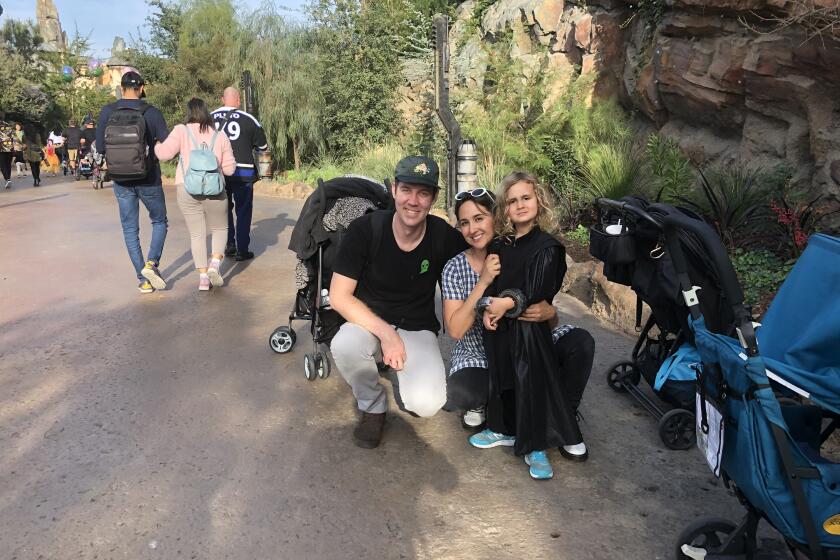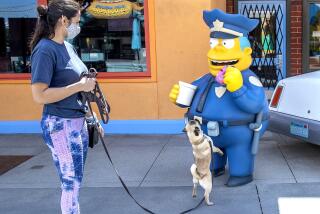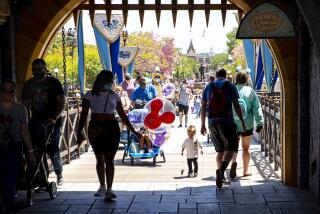Disneyland and Universal Studios to close for the rest of the month because of coronavirus
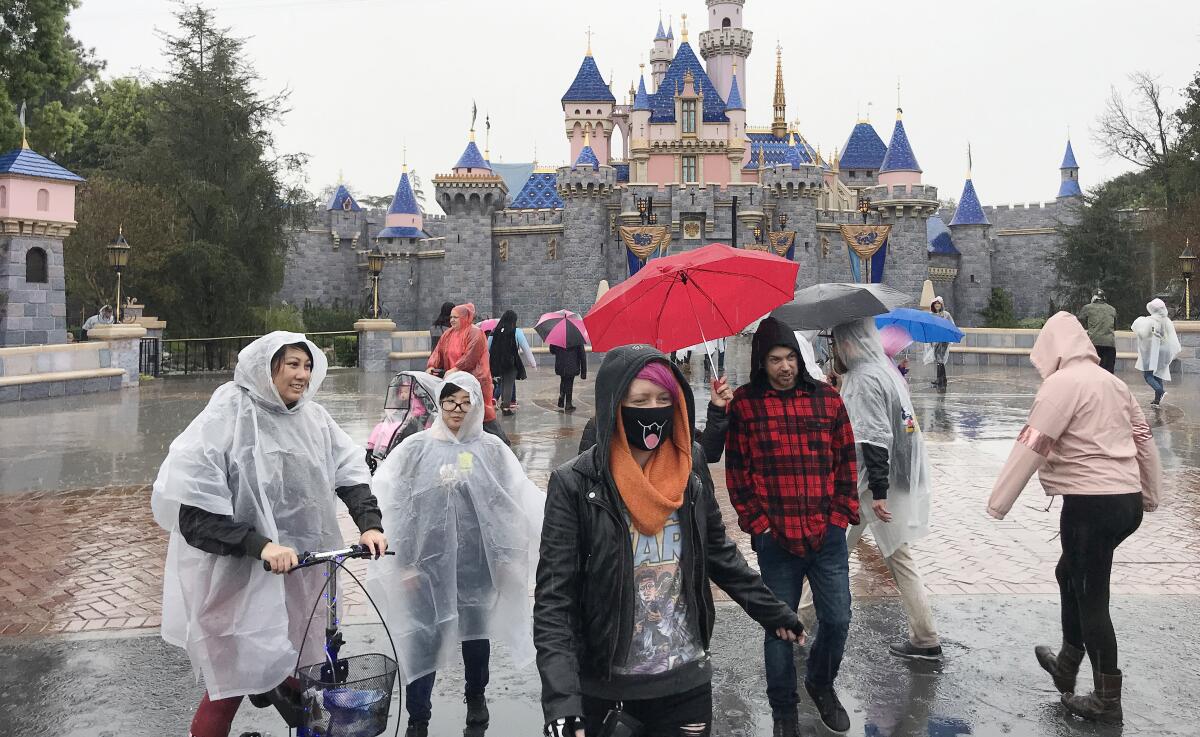
At first, Thursday seemed like it was shaping up to be a typical — and typically busy — day at the “Happiest Place on Earth.”
Just before 10 a.m., the wait times for Disneyland’s popular attractions at its Anaheim theme park were significant — 55 minutes for the Matterhorn Bobsleds and 45 minutes for Space Mountain, according to the park’s mobile app.
Guests were posting happy pictures of their visits, although some acknowledged that there was more than the threat of weather that could rain on their parade.
“The most magical place on Earth!” one Instagram user wrote. “Except for when it’s pouring rain and everyone has coronavirus … maybe not then.”
Then, Thursday afternoon, the news came: In light of the COVID-19 pandemic and Gov. Gavin Newsom and health officials’ recommendation that gatherings of 250 or more people be canceled across the state, the park that essentially never closes would temporarily shut down.
Get the latest coronavirus updates from our staff in California and around the world.
Disneyland and Disney California Adventure will close Saturday morning through the end of the month, company officials said. The company said it will refund hotel bookings during the closure.
“While there have been no reported cases of COVID-19 at Disneyland Resort, after carefully reviewing the guidelines of the governor of California’s executive order and in the best interest of our guests and employees, we are proceeding with the closure of Disneyland Park and Disney California Adventure, beginning the morning of March 14 through the end of the month,” Walt Disney Co. said in a statement Thursday afternoon.
“The hotels of Disneyland Resort will remain open until Monday, March 16, to give guests the ability to make necessary travel arrangements; Downtown Disney will remain open. We will monitor the ongoing situation and follow the advice and guidance of federal and state officials and health agencies. Disney will continue to pay cast members during this time.”
About two hours after Disneyland’s announcement, Universal Studios Hollywood announced it would close Saturday and reopen March 28. (Universal CityWalk will remain open.)
It remains to be seen whether other California theme parks will follow suit, but Newsom said to “expect more announcements like this shortly.”
Newsom — who during a news conference earlier in the day had said the state’s guidelines excluded large parks like Disneyland and places such as casinos, card rooms and movie theaters because of “the complexity of their unique circumstances” — applauded Disneyland’s announcement.
“Late last night, California put out a new policy on mass gatherings and engaged in deep conversations with Disney and other companies about how to meet it,” he said. “Using that policy, Disney made the right call in the interest of public health and agreed to shut down their California parks.”
Disneyland was not the only Southern California theme park open for business Thursday morning, even after the guidance from the governor, which does not carry the force of law.
Six Flags Magic Mountain opened as scheduled, with officials emphasizing the measures they were taking to clean and sanitize the park.
Mike Spanos, president and chief executive of the Six Flags Entertainment Corp., previously wrote a public note emphasizing “the top priority at Six Flags is the safety and the well-being of our guests and team members.”
He said Six Flags has “significantly enhanced” its cleaning and sanitation efforts and is asking employees who are sick to stay home.
“If anyone has a fever or becomes sick while at work, we will immediately release them to see their medical provider,” he wrote. “We hope that these measures give you confidence that we are taking the necessary precautions in this evolving situation.”
Legoland California also was open for business, though officials released a statement Thursday evening that it was postponing its grand opening of The Lego Movie World.
SeaWorld San Diego also remained open. On Facebook, the park’s most recent post was about its Seven Seas Food Festival this weekend.
“SeaWorld San Diego is currently operating on its normal hours of business but have canceled scheduled shows,” Kelly Terry, SeaWorld spokeswoman, said in a statement. “We will continue to monitor the situation for changes, collaborate with health officials and take the necessary steps to address the health and safety needs of guests, ambassadors and animals.”
Pacific Park at the Santa Monica Pier will remain open, weather permitting. Park management said in a statement that they’ve amplified their maintenance schedule, including pressure-washing tables, handrails and counters with hot water.
“We are working closely with the City of Santa Monica and Los Angeles County and its Department of Public Health and have not received direction to alter our operations in any way,” park management said in a statement.
A representative of Knott’s Berry Farm said Thursday morning that the Buena Park attraction “is aware of the new guidance issued by the state of California last night regarding large events based on the COVID-19 outbreak. Knott’s Berry Farm is open today as we understand and evaluate what this means for our park, our guests and our associates.”
Knott’s did announce it would close early Thursday — but because of inclement weather.
The governor also has been in talks with movie theater companies, which he said already are making efforts to deal with lines and introduce social distancing, the practice of staying away from crowded areas to reduce the spread of an infectious disease.
Until now, the decision to implement limitations on large gatherings had been left to the discretion of county public health officials, who the governor previously said are best equipped to make decisions for their communities.
The new state group gathering advisory, which does not carry the force of law, stops short of asking Californians to change their work, travel or leisure habits.
A document provided by the governor’s administration said the limit on large gatherings does “not apply to essential public transportation, airport travel, or shopping at a store or mall.”
The new directive also reflects guidelines issued by the federal Centers for Disease Control and Prevention this week to cancel large gatherings greater than 250 people in communities with minimal to moderate community spread.
Newsom said Thursday that theme parks were not going to be completely exempted from the state’s guidelines, and that officials were working on a policy that accounts for their unique needs. He also said he talked Wednesday with Disney’s executive chairman and former CEO, Bob Iger.
“Disneyland, I think, has a thousand people on a ride every hour, and concerts and theaters. They have parades. That’s a nation-state campus environment. I mean, that’s a whole different thing,” Newsom said.
Disneyland visitors take reasonable precautions but are determined not to let coronavirus fears get in the way of having enjoying the Anaheim theme park.
The news of Disneyland’s impending closure — apparently the first since the 9/11 terrorist attacks — came around 1:30 p.m. Thursday.
Before announcing the closure, Disney had said in an online message that Disneyland and its Disney World resort in Florida were still open and “we continue to implement preventative measures in line with the recommendations of the Centers for Disease Control and Prevention, as well as state and local health agencies.”
The online message said the parks added additional hand sanitation stations and increased the frequency of cleaning and disinfecting “high guest contact areas.”
The city of Anaheim said on its website that it is closely watching the coronavirus outbreak in order to determine whether locations should be closed.
“We expect to see changes in Anaheim in coming days based on the [governor’s] policy,” officials said. “As a major visitor city, the guidelines cover Anaheim’s sports, entertainment, convention and other venues, as well as larger events.”
The financial effect on Anaheim and hotels, shops and tour companies that rely on the resort could be steep.
A study released last year by the Cal State Fullerton’s Woods Center for Economic Analysis and Forecasting estimated that the resort generates $8.5 billion in economic activity each year for the Southern California economy and is responsible for 78,000 jobs, mostly in Orange County.
The resort also generates $510 million in state and local taxes, with nearly $162 million going to the city of Anaheim, according to the study.
Times staff writers Phil Willon, Taryn Luna and Jaclyn Cosgrove contributed to this report.
More to Read
Sign up for Essential California
The most important California stories and recommendations in your inbox every morning.
You may occasionally receive promotional content from the Los Angeles Times.
